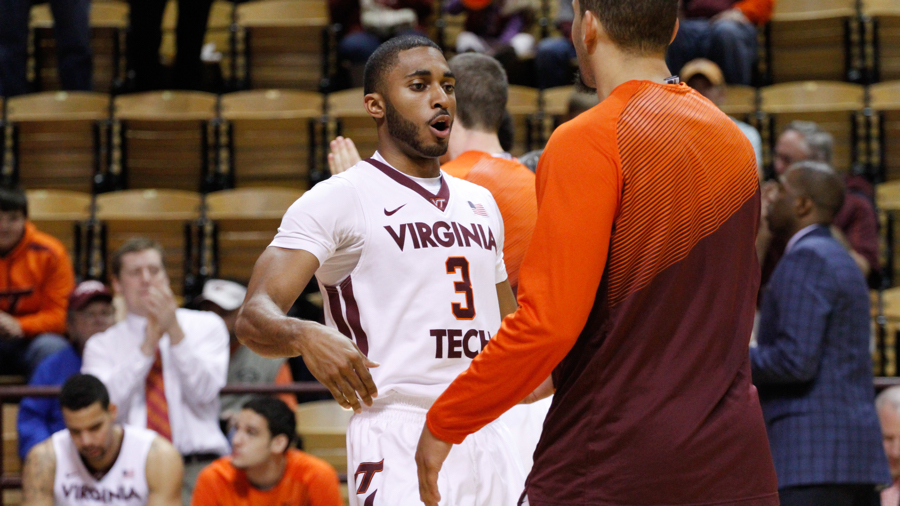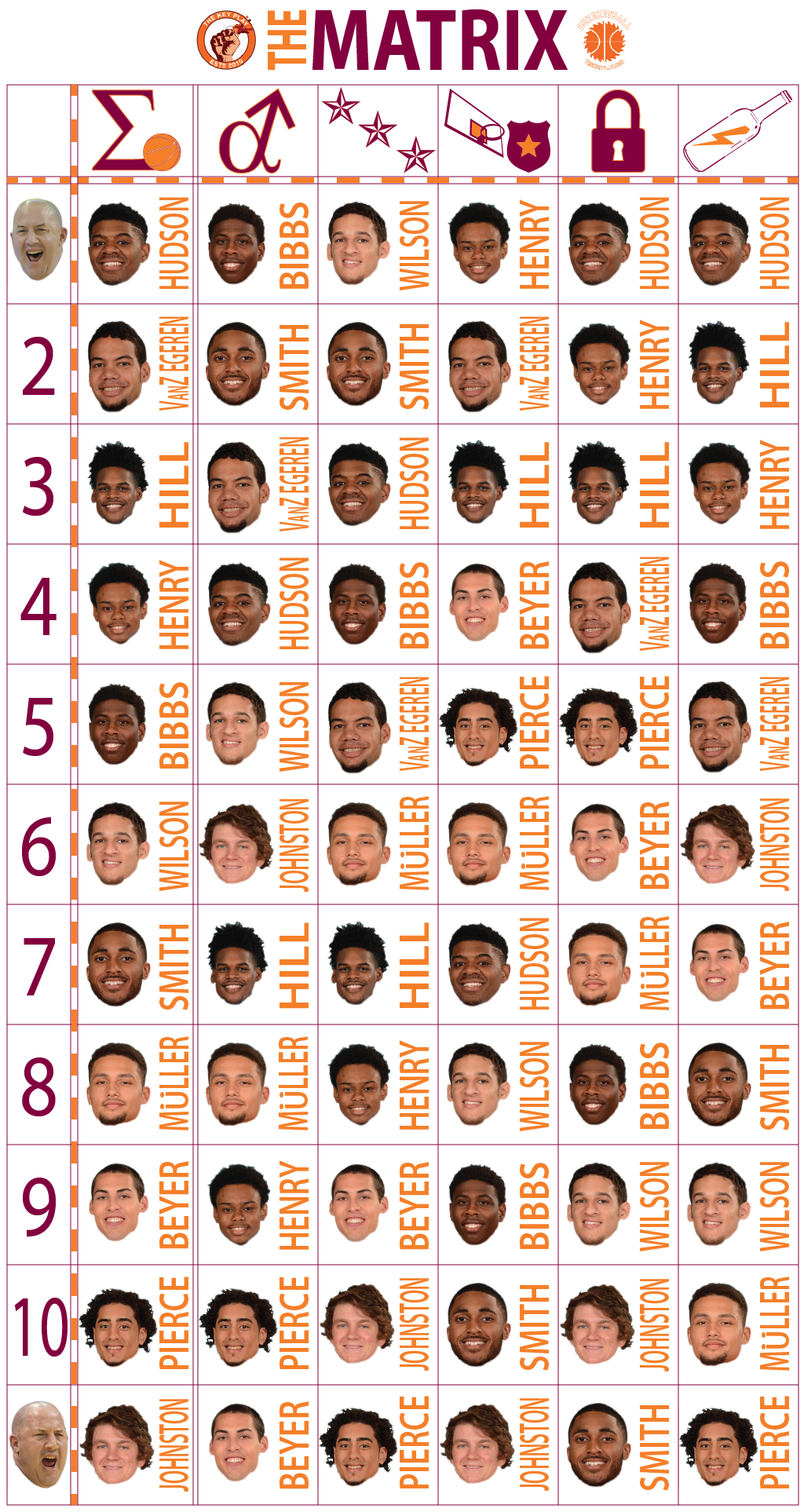Welcome back to The Matrix; The Key Play's odyssey into the current and future state of the Virginia Tech men's basketball team. Since we last met, Coach Buzz Williams has — to put it simply — proven that he is not afraid to mix things up. A finals week matchup against Alabama A&M saw Matrix 1.1. Composite No. 11 Christian Beyer lead the team in points and rebounds. Three weeks later, a practice incident led to the indefinite suspension of center Joey van Zegeren, making an already height-deficient team shorter heading into the meat of their ACC slate.
Seven more games in the books and the Hokies sit at 8-7 on the season, 0-2 in conference play. While the record is disheartening, this team has played hard and shown a considerable amount of growth against mid-major and Top 25 teams. Four of the Hokies' seven losses have been by one possession, including a gut-wrenching two-point loss to the Syracuse Orange.
Over the last seven games, fresh faces excelled in various roles and established players struggle to keep up. The Matrix has undergone a massive shakeup thanks to Buzz's constant rotation tinkering, and we are beginning to have a clearer understanding of what each player brings to this program.
A quick reminder of how The Matrix works: The Matrix is essentially the manifestation of my game-by-game analysis of this continuously developing basketball team. My analysis relies on both game-by-game and season-long statistics, as well as some subjectivity (my eye test) to order players 1-11 in five categories that factor into a composite rank.
The five categories — Alpha Male, Floor General, Rim Protector, Lock-Down Defender and Energy Guy — are the basis for the composite score, which provides an overview of how Tech's players shake out across the board. Keep in mind, the composite doesn't necessarily yield a best-to-worst rank, because the categories don't fairly reflect that.
For a more detailed summary of the various categories, take a read through Version 1.1.
The Matrix 1.2
Alpha Male

Through fifteen games, there's no debating that freshman Justin Bibbs has firmly established himself as the main scoring threat for the Hokies. He has found ways to score from all over the court, and his perimeter game gets stronger every week. In order to keep him from hitting the proverbial freshman wall, it is imperative that additional scoring threats emerge to relieve some of the load from Bibbs' shoulders. One of those threats appears to be Adam Smith, who has evolved into a capable No. 2.
Prior to this season, Smith was viewed predominantly as a dangerous perimeter shooter. While he continues to display a deadly three-point stroke, Smith's offensive repertoire has continued to develop as the season has gone on. Against smaller perimeter-oriented teams, Smith regularly took on defenders off the dribble with great success. Not only did Smith finish well around the rim, but I was very impressed with his mid-range pull-up in one-on-one situations.
The 6-1 Smith, mixed in step-back and subtle fade-aways when pulling up from 10-15 feet. This tactic bought Smith a few extra inches of space to comfortably shoot without fear of having the shot blocked. A familiar play design ran Smith off a screen at the wing, where he would dribble hard to the free-throw line and pull up. Against taller guards, there's been a downturn in the number of mid-range pull-ups over the last four games.
Here's the thing about Smith: He can be lethal from distance, but he tends to score in bunches and has a tendency to disappear for long stretches. Similar to Michael Brewer's success in the pocket, Smith thrives once he finds his rhythm. A great example is the pair of three pointers Smith nailed on consecutive possessions against Florida State.
While the bursts of scoring are always welcome, Smith needs to become more confident in creating high-percentage opportunities. Those opportunities will hopefully keep this young team out of the prolonged scoring droughts that seem to haunt them every game. As Smith adjusts to the taller defenders as the season progresses, I would expect to see him pick his spots and mix in the mid-range jumper more often.
Floor General

All season we have openly wondered who would establish themselves as the primary ball handler while starting point guard Devin Wilson is on the bench. Through 15 games, I would be lying if I didn't acknowledge that the situation is murky, at best. We have seen Buzz employ a variety of guards at the point, including leading scorer Justin Bibbs and pre-season favorite Malik "Dots" Müeller. Bibbs proved to be capable but more potent off-the-ball, while Müeller has seen his minutes fluctuate (likely) as a result of his physical limitations.
We're approximately halfway through the schedule and Dots' season has been disappointing, to say the least. I will openly admit my surprise at the limited role Müeller has had thus far. For a player widely believed to be a key contributor and most likely to spell Wilson after a high-mileage freshman campaign, The Umlaut's butt must be sore from all the minutes he has spent on the bench.
Consider this: Müeller's minutes per game have been cut in half over the last 7 games compared to the first 8, and his points, rebounds, and assists have predictably followed suit.
| Span | Minutes Per Game | Starts | Points Per Game | Rebounds Per Game | Assists Per Game |
|---|---|---|---|---|---|
| First 8 Games | 22.6 | 7 | 5.4 | 2.5 | 2.0 |
| Last 7 Games | 11.4 | 0 | 2.4 | 1.4 | 0.4 |
Despite the reduction in minutes, Müeller's production has remained relatively stable on a per-40 minute basis. The biggest drop-off has occurred in his assist numbers, and much of that is due to his recent use as an off-guard (Buzz has tried to take advantage of his stout frame when implementing shorter lineups).
Without knowing what goes on in practice, I would venture to guess that Müeller's limited minutes have been more a product of certain matchups and less an indictment on his potential. Against VMI, his ability to get up-and-down the court likely kept him on the bench. However, against WVU's full-court trap, Müeller came in around the 10 minute mark of the first half and was the key element in solving the 'Neers' pressure.
I still believe that in most situations this team is better with Müeller on the court, but the emergence of Ahmed Hill as a two-way player and the proliferation of Adam Smith's offensive game have limited Müeller's role. It will be interesting to see how The Umlaut is deployed as the season wears on. If I had to guess, I would say that he may end up being the guy that provides cohesion during stretches where the starting guards are rotated in and out of the game.
Rim Protector

I have said it before and I will say it again: I have a man crush on Shane Henry.
The JUCO transfer has emerged as a force in the paint, using his natural instincts and impressive leaping ability to challenge shots and attack the boards. With JVZ watching from home, the 6-8 Henry has performed admirably against bigger post players in limited minutes despite typically being the only non-guard on the floor.
A silver lining in JVZ's suspension is the increase in minutes provided to freshman Satchel Pierce. In the two games without JVZ, Satch has averaged 19 minutes per game and has played well despite surrendering a number of pounds to his man. He has flashed a number of above-average post moves and a soft touch near the rim. Be that as it may, I'm still not 100% convinced he is going to be this team's starting center after JVZ has left Blacksburg for one reason: I'm afraid Big Satch might be too nice.
Being seven feet tall with some nifty post moves doesn't automatically make you an ACC-caliber starting center. You need to be mean but composed; you need to know how to bully the opponent and impose your will in the paint; you need to throw the occasional elbow to put your man in his place; and you need to have the instincts to know how and when to bail out your teammates. Some of these traits can be taught — others are innate.
I think Satch has a ton of potential, some of which he has already exhibited on the court. The one thing we have yet to really see is Angry Satch. I keep waiting for him to get scrappy or his facial expression to change once. Is a frown too much to ask for? For all we know, that inner tenacity may already be in Big Satch somewhere, but the bright lights have held it at bay.
There are times where you can see Pierce banging around in the post trying to maintain proper position on his man. On the following possession, the game appears to be moving too fast for him and he looks glued to the floor.
In order for him to truly reach his perceived potential, that anger will need to manifest itself in one way or another. Otherwise, he will be just another tall guy that played some hoops in college.
Lock-down Defender

Devin Wilson's play this season has been confusing to me. His numbers continue to look strong despite moments where you forget he is on the court, and he is the one bringing the ball up the court. Without bogging everyone down with minutiae, I will simply state that I feel some of Devin's offensive and defensive numbers are deceiving. This sentiment works both ways; while I feel his defensive numbers embellish his defensive contributions, his assists (for instance) are significantly lower than where they should be thanks to far-too-many failed conversions on the back end.
Sure he has a team high 15 steals, but very few (if any) of those have come from lockdown on-the-ball defense. Many of those 15 picks are the result of being in the right place at the right time, thanks to hounding defense and active hands by teammates that have forced and deflected passes his way. Wilson is an adequate defender and rebounds well for his position, but I doubt Devin's name is near the top of Buzz's list when looking to shut down a hot-handed opposing guard.
For what it's worth, Malik Müeller is second on the team with 13 steals in half as many minutes thanks to strong positioning off-the-ball. In man-to-man sets, Dots splits the floor well when the ball is on the opposite side of the court from his man. This allows him to step into the lane to provide good help defense with adequate time to recover, as well as enabling him to intercept loose balls and entry passes.
So why is he so far down the rankings? Positioning can only get you so far when your defensive slide is — to put it kindly — slow. He can be a bit slow to recover and he struggles rotating against quick ball movement when the Hokies are in a zone defense. All that being said, his thick frame has proven to be an asset in recent games, as The Umlaut has admirably bodied up larger post players and caused a considerable amount of disruption despite the size differential.
Energy Guy

Jalen Hudson and Shane Henry may very well have the top two spots in this category locked up for the foreseeable future. Over the last seven games, the biggest surprise has been the solid play of Christian Beyer. When The Matrix 1.1 was released, Beyer had logged a grand total of four minutes for the Hokies. Four. Since then, Beyer has scored 15 points and grabbed 14 boards in 54 minutes (though it should be noted that he has not seen the court in either of the last two games). Look, Beyer's lack of minutes — both prior to and during the suspension of JVZ — is a reflection of his limitations as a basketball player.
His skill set is best suited as a 5, but he is 2-3 inches too short to consistently play the position against major conference foes. He is strong and athletic, but he's not going to wow you with his quickness or leaping ability. With that being said, he's more than just a big body that can come in and pick up fouls. Beyer has proven over the last month that he can be counted on for his toughness, setting good, solid screens and knocking guys around in the post. His limited offensive repertoire keeps him from being the flasher to the elbow against the zone, but he has done a great job running the baseline and sealing defenders to create scoring opportunities.
Regardless of JVZ's status for the remainder of the season, Beyer has proven that he can be counted on in whatever capacity Buzz needs him. He has displayed a penchant for bringing hard-nosed play without playing out of control. As the season wears on, that discipline could prove to serve this young team well when facing adversity in tough environments. At a minimum, the younger post players can learn a thing or two about how Beyer takes advantage of his minutes.



Comments
Please join The Key Players Club to read or post comments.
Please join The Key Players Club to read or post comments.
Please join The Key Players Club to read or post comments.
Please join The Key Players Club to read or post comments.
Please join The Key Players Club to read or post comments.
Please join The Key Players Club to read or post comments.